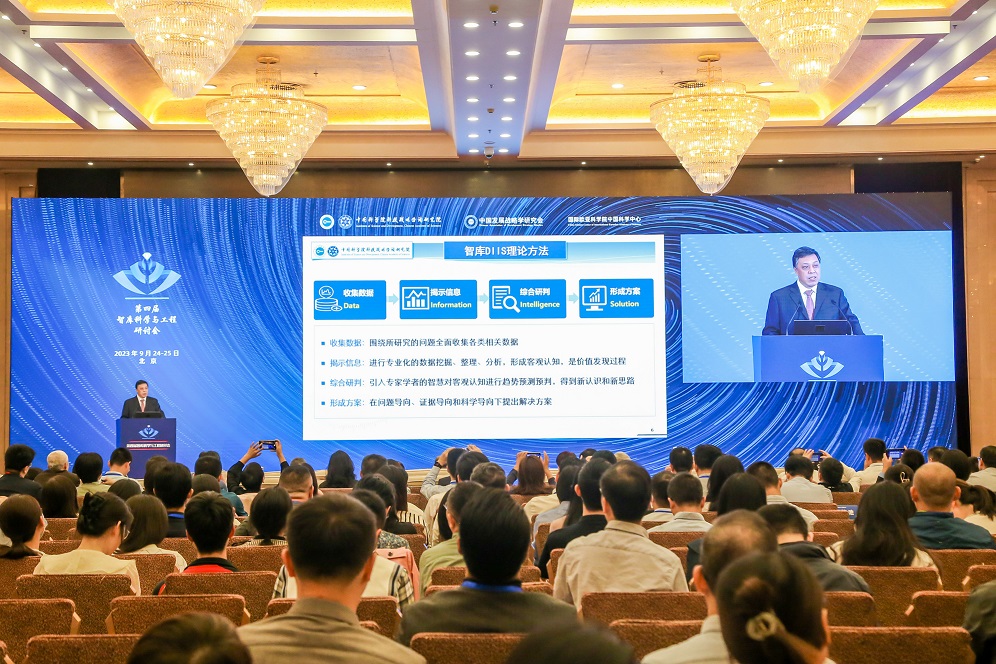Book Exploring Development System of Think Tanks with Chinese Characteristics Released
A book that systematically elaborates on the disciplinary structure of think tank science and engineering and explores methods of constructing new think tanks with Chinese characteristics was released at the 4th Think Tank Science and Engineering Seminar on Sunday. Known as "Think Tank Science and Engineering: An Introduction", the book includes an epistemological and talent cultivation system and reflects the latest research achievements of the Institutes of Science and Development, Chinese Academy of Sciences (CASISD).
The seminar was co-hosted by the CASISD, the Chinese Association of Development Strategy Studies (CADSS), and the China Science Center of International Eurasian Academy of Sciences in Beijing.
The book provides a detailed introduction to the discipline of think tank science and engineering; describes how it emerged and the development it has gone through as well as associated concepts, theoretical paradigms, logical frameworks, and related methodology; and proposes five major domains for the field, namely a basic problem domain concerned with elaborating concepts, theoretical paradigms, and epistemology associated with the discipline; a domain concerned with key knowledge and issues pertaining to the discipline and their evolution; a governance domain concerned with major social, economic, and scientific and technological governance issues; a domain concerned with methodology and innovation covering methods, models, and applied technical systems; and a knowledge dissemination domain focused on the formation of academic communities, communication and exchange in think tank research, and cultivation of think tank talents.

PAN Jiaofeng, CASISD president and CADSS chairman, delivers a speech. (Photo by Zheng Liang)
Following the 2019's "DIIS Theory and Methodology in Think Tanks" and 2022’s "Double Helix Methodology in Think Tanks", the "Think Tank Science and Engineering: An Introduction" is the third installment of PAN Jiaofeng, CASISD president and CADSS chairman’s trilogy themed on exploring methods of establishing new think tanks with Chinese characteristics.
Like a strand of DNA, the double helix methodological system put forth by PAN’s team features two main interconnected components – an integrated model concerned with data, information, intelligence, and solutions (DIIS) and one covering mechanisms, impact, policy and solutions (MIPS). The model includes an internal process consisting of the interaction between DIIS and MIPS and an external process comprising decomposition, fusion and restoration.
The new book summarizes the intellectual journey that PAN has gone on, practical experience that has been obtained, and the construction and development process of high-end scientific and technological think tanks as they evolve from specialization to scientification to disciplinization. It reflects a scientific development approach in which think tanks focus on studying, researching, and gaining a deep understanding of real problems and a long-term iterative process involving practical application, theoretical exploration, theoretical innovation and practical deepening and intensification.
PAN noted that think tank science and engineering is an emerging interdisciplinary field that is in an original innovation-driven development period when he spoke at the event. He remarked that it is fueled by powerful demands associated with advancing global governance, keeping abreast with and outperforming international competition, and helping to realize the great rejuvenation of the Chinese nation in the face of the profound changes unseen in a century that are currently occurring and that it will effectively advance the intensive emergence of theoretical think tank innovation and achievements, form dominant theories in think tank studies, and gradually move towards refinement.

The book “Think Tank Science and Engineering: An Introduction” was released. (Photo by CASISD)
"Standing at the starting point of a new journey, we hope to work with all sectors of society to advance think tank construction from specialization to scientification to disciplinization in China, in order to develop the discipline and related concepts and planning; cultivate think tank research talents; formulate Chinese theories, philosophies, and schools of thought; and construct independent knowledge systems that comprehensively promote the great rejuvenation of the nation on its path to modernization," PAN stated.
A book that summarizes laws that have emerged and standardized procedures that have been formulated in the course of the application of double helix methodology across various types and scales of think tank research known as "Applications of Double Helix Methodology in Think Tanks (Volume III)" was also unveiled at the symposium. The book proposes systematic methods designed to improve the quality of the results that are obtained in the course of think tank research in order to better serve scientific decision-making.
As a science that explores laws and paradigms via professional study and requires in-depth investigation into theory and practice in order to produce results that are more scientific, the think tank development outlined by PAN integrates theoretical methods, research paradigms, academic systems, the scientific community, academic journals, and talent training and development. Identified as one of the first 10 pilot organizations designed to help build China’s first-class think tanks working directly under central authorities in 2015, CASISD serves as a comprehensive platform combining high-quality academic study with the promotion of research designed to impact decision-making and has been at the forefront of China’s high-end think tank construction.

Group photo (Photo by CASISD)